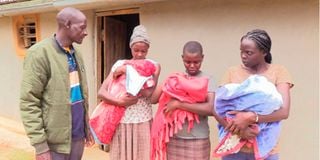
Julius Losiakep Teletum with three volunteers carrying triplets whose mother died three weeks after their birth at Kaplelachkoror village in West Pokot County on February 27, 2024.
Anthony Koross, a nurse from West Pokot, brings a sharp eye to the recent article spotlighting the story of Julius Teletum, who lost his wife shortly after she gave birth to triplets.
The headline, “A widower’s heartache: Losing wife weeks after triplets’ birth, left with 9 children”, captured the attention of readers. It was prominently published on page two of the Daily Nation of March 1, 2024.
Mr Teletum’s wife, Mercy Chepkorir, breastfed the triplets for 12 days before falling ill and shortly dying.
The Ministry of Health advocates exclusive breastfeeding for the first six months. But the infants were reported being fed on Nan, an infant formula brand.
Mr Koross, who is not just a nurse but also a PhD student at Masinde Muliro University, raises concerns about the biased marketing of one brand in the narrative.
Further investigation
The story, by Oscar Kakai, attributes the woman’s death to pneumonia without delving into whether an autopsy was conducted.
Mr Koross questions the lack of further investigation into the cause of death and calls for insights from medical experts to shed light on the situation and what happened.
While acknowledging the Kaplelachkoror Village community’s support in caring for the triplets, including volunteers who have rallied around Mr Teletum, questions linger about the assistance provided to the grieving father.
Voices from his village underscore the challenges faced by the family after the death of his wife and call upon the authorities and well-wishers to lend a helping hand.
Healthcare reporting
Amidst the pleas for aid narrated in the article, Mr Koross advocates a more comprehensive approach to storytelling.
He emphasises the importance of including perspectives from healthcare professionals to offer a holistic view on matters such as infant feeding practices, maternal health audits and the broader context surrounding maternal mortality in West Pokot County.
Scrutinising the journalistic integrity of the story, he commends the Nation for bringing attention to Mr Teletum’s plight.
But he also points out the missed opportunity in consulting healthcare experts for a more informed narrative. Highlighting the inadvertent promotion of Nan, he suggests a more neutral approach to preserve journalistic neutrality.
Mr Koross calls for greater diligence in healthcare reporting. He hopes such stories in the Nation will strive toward a more comprehensive and balanced depiction of health-related stories.
***
Unearthing the true meaning of ‘returning a body to Kenya’: Reader Simon Orucho raised concern regarding the use of the term ‘returned’ in a Nation headline that read, “Body of former athlete Josephat Kibet who drowned in Mexico returned to Kenya” (Nation.Africa, Feb. 11, 2024).
He questioned whether the term ‘returned’ was appropriately used as the story stated that the athlete died in Mexico. Mr Orucho approached the issue from a logical perspective.
Yet, the English language often defies logic. Githuku Mungai, another reader who regularly corrects errors in the Nation, asked ChatGPT whether the use of the term ‘return’ in the headline was incorrect.
ChatGPT said return’ is a precise term, which may seem counterintuitive but is, indeed, accurate in the context.
The term signifies the action of revisiting a prior location, regardless of the individual’s condition during the return journey.
In this case, if Josephat Kibet left Kenya alive, ventured to Mexico and, unfortunately, passed away there, then his body’s transportation back to Kenya qualifies as a ‘return’.
Although it may seem unusual, the term’s usage in this context is correct and adheres to the rules of the English language.
***
Journalists to be rewarded for exposing xenophobia in South Africa: Last time I visited Johannesburg, a group of Kenyans and I were held at gunpoint and robbed in the parking lot of our hotel, all in plain sight.
Unfortunately, nobody came to our aid, and the local authorities showed little enthusiasm in investigating the incident.
Furthermore, the media seemed uninterested in reporting the incident, which led me to believe that we had become easy targets and neglected victims due to being labeled as “makwerekwere”—a derogatory term for people from other African countries.
In response to the persistent occurrences, the ILO, IOM and EU have launched a competition to reward journalists who contribute to exposing the xenophobia and the hate, discrimination and racism associated with the term “makwerekwere”.
Winners will receive cash prizes, providing incentives for journalists to delve deeper into the problem.
This initiative is a significant step towards combating xenophobia in southern Africa.
The Public Editor is an independent news ombudsman who handles readers’ complaints on editorial matters including accuracy and journalistic standards. Email: [email protected]. Call or text 0721989264










